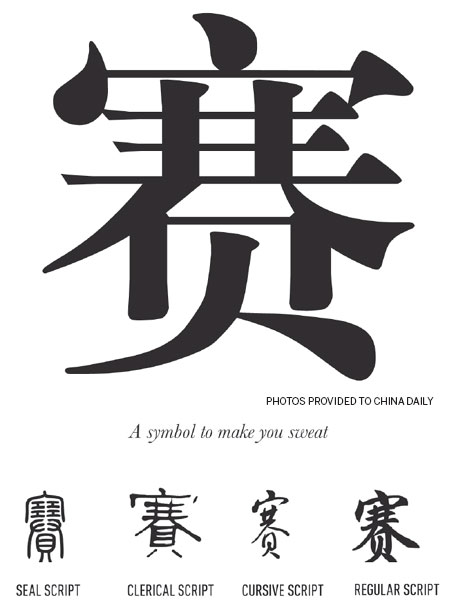Contests full of character

This symbol has gone from ancient ritual to the world of modern sports
中國人的競爭意識無所不在, 即使是在兩千年前祭神的時候
It used to be a ritual in which humans knelt before the gods; now 賽 (sài) is all about challenging ourselves to be the best we can be. This character appears whenever there's a contest: a football match (足球賽 zúqiú sài), a cycling contest (自行車賽 zìxíngchē sài), or a debate competition (辯論賽 biànlùn sài).
賽 is a pictophonetic character (形聲字 xíngshēng zì) consisting of a pictographic element where the meaning resides and a phonetic element. The upper part is borrowed from 塞 (sāi, fill in) to represent its pronunciation. The lower part, 貝 (bèi) stands for seashell. You might wonder what that have to do with its meaning? Judging from its seal scripts which date back to more than 2,000 years, the lower part is actually two hands holding a piece of seashell - an object of great value for the inland ancients. In order to show respect to the gods, they offer to sacrifice their precious seashell. Therefore, the original meaning of 賽 is "sacrifice to gods". In modern Chinese, this meaning is only preserved in a few words referring to rituals in which offerings of gratitude were given to gods, such as 祭賽 (jì sài), 賽神 (sài shén) and 賽社 (sài shè).
About 1,500 years ago in the Book of Wei (《魏書》wèi shū, a historical work recording the Northern Wei and Eastern Wei dynasties from AD 386 to 550) we spotted the first use of 賽 means "contest".
Some suspect that such a change of meaning derived from the fact that when families put on their sacrifices, such as geese or pigs, they tended to compare sizes; the bigger the more sincere to the gods and higher in social status.
Other traditional contests include poem contest or 賽詩 (sài shī) during the Dragon Boat Festival, and lantern contest or 賽花燈 (sài huā dēng) during the Lantern Festival.
The words 競賽 (jìngsài) or 比賽 (bǐsài) mean competition or match. The two characters, 競 and 比, have interesting and similar origins that complete the meaning of 賽. Both of those characters appeared more than 3,000 years ago on the oracle bones in the form of two people standing side by side. The difference is these people's identity: in 比, the two is a couple, which originally meant "close and intimate".
The concept of comparison and competition emerged later. For 競, it was a life or death situation from the beginning. The graph indicated that the people in 競 are wearing barnacles, meaning they are prisoners. Like in the Colosseum, it seems that the fights between prisoners were also a pastime for the Chinese ancients.
Nowadays, 賽 is mainly associated with sports competition. A race is 賽跑 (sàipǎo), car race is 賽車 (sàichē) and horse race is, by parity of reasoning, 賽馬 (sàimǎ). For competition related terms and phrases, you will never be wrong by throw in some more 賽. Preliminary competition is 初賽 (chūsài), quarter-final is 復賽 (fùsài) and final is 決賽 (juésài). A championship or tournament is 錦標賽 (jǐnbiāosài), literally "a competition for brocade flag", because grabbing the flag used to be the sign of victory for dragon boat races. The same prefix is true for venue, area and time: competition field is 賽場 (sàichǎng), division is 賽區 (sàiqū) and season is 賽季 (sàijì).
Besides being the building blocks of a series of contest-related words, 賽 alone can be used as a verb, meaning "equal" or even "outmatch". For instance, 這里的風光賽江南. (Zhèlǐ de fēngguāng sài jiāngnán) - the view here is better than the south of Yangtze River; or 這些姑娘干活兒賽過小伙子.(Zhèxiē gūniang gàn huó er sàiguò xiǎohuǒzi.) - these ladies got the job done better than the men.
If you are having an extremely good time, you can describe it as 賽神仙 (sài shénxiān), merrier than the immortals. There's also a case of smart translation worth mentioning: Subway, the US sandwich store, picked 賽 as a part of its Chinese brand name 賽百味 (sài bǎi wèi), which not only resembles its English pronunciation but means "better than all kinds of other flavors".
Courtesy of The World of Chinese,
www.theworldofchinese.com
The World of Chinese



















